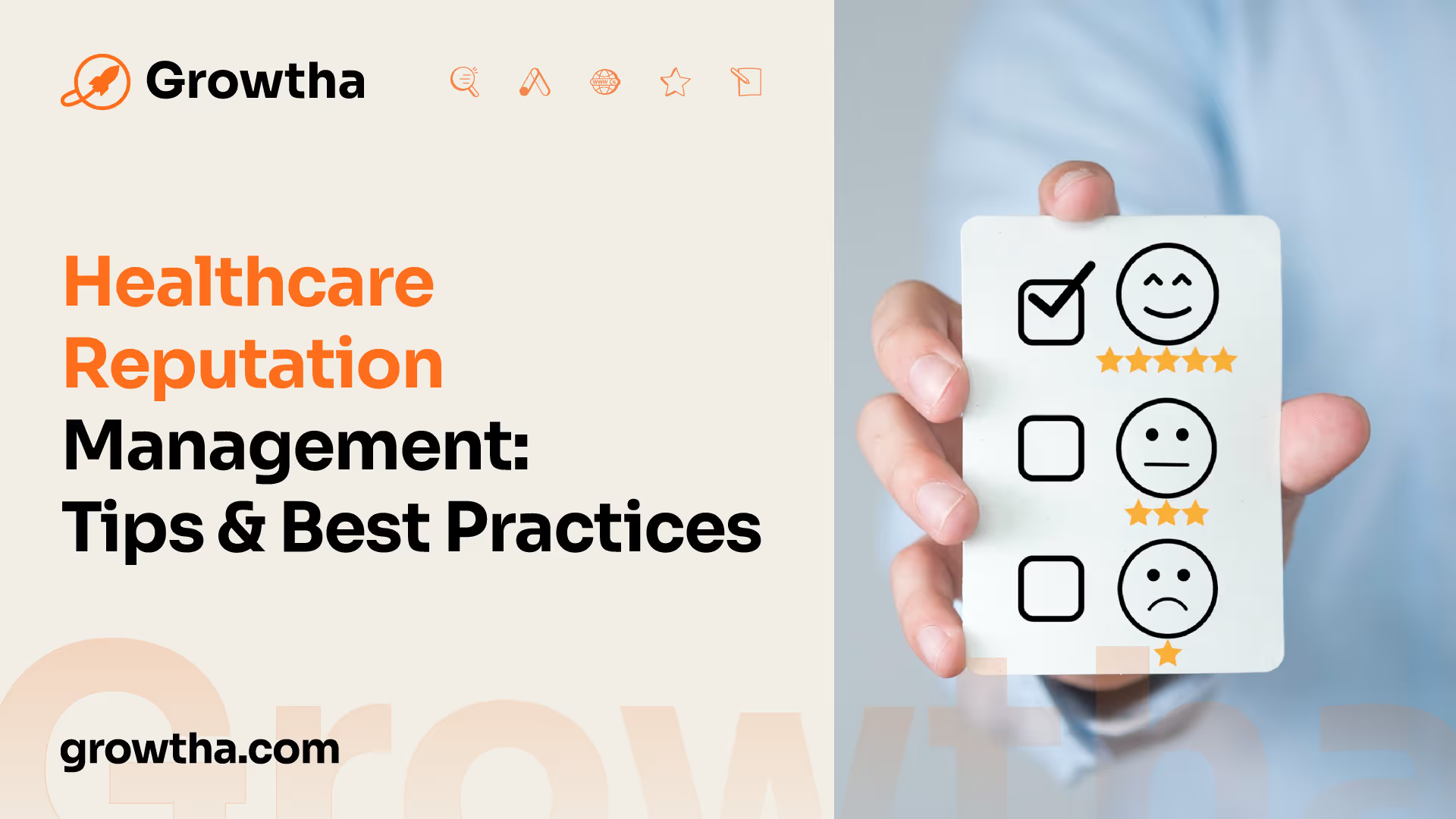Healthcare Reputation Management: Tips & Best Practices
In today's digital age, healthcare reputation management plays a vital role in maintaining a positive image and attracting patients.


Healthcare Reputation Management: Tips & Best Practices
Introduction to Healthcare Reputation Management
In today's digital age, healthcare reputation management plays a vital role in maintaining a positive image and attracting patients. This section will explore the importance of healthcare reputation and the impact of online reviews.
Importance of Healthcare Reputation
A strong reputation is crucial for healthcare providers as it directly influences patient trust and loyalty. A positive reputation not only attracts new patients but also helps in retaining existing ones. According to a study, 84% of consumers trust online reviews as much as personal recommendations when selecting a healthcare provider [1]. A good reputation can enhance credibility, build patient confidence, and ultimately lead to increased patient satisfaction.
Patients often rely on search engine results and online reviews to make informed decisions regarding their healthcare providers. A positive reputation can differentiate a healthcare provider from competitors and position them as a trusted and reliable choice.
Impact of Online Reviews
Online reviews have become a significant factor in shaping the reputation of healthcare providers. Patients are increasingly sharing their healthcare experiences on various platforms, including review sites, social media, and healthcare-specific websites. Positive reviews can reinforce a healthcare provider's reputation, while negative reviews can have a detrimental impact if left unaddressed.
Promptly responding to online reviews is crucial in healthcare reputation management. Negative reviews, if left unaddressed, can harm the reputation of a healthcare provider [2]. Timely and thoughtful responses to negative reviews demonstrate a commitment to patient satisfaction and can help mitigate the impact of the negative feedback.
Monitoring online mentions and reviews is essential to stay informed about what patients are saying about a healthcare provider. This allows healthcare organizations to address any issues promptly, resolve patient concerns, and improve overall patient experience. By proactively managing online reviews, healthcare providers can maintain a positive online reputation and build trust with current and potential patients.
In conclusion, healthcare reputation management is crucial for healthcare providers to maintain a positive image, attract new patients, and retain existing ones. Online reviews have a significant impact on a healthcare provider's reputation, making it essential to promptly respond to feedback, build a strong online presence, and monitor reviews and mentions. By effectively managing their reputation, healthcare providers can enhance patient trust, satisfaction, and ultimately, the success of their practice.

Best Practices for Healthcare Reputation Management
Healthcare reputation management plays a vital role in attracting and retaining patients. Implementing effective strategies and best practices can help healthcare providers build a positive online presence and maintain a stellar reputation. Here are some key best practices to consider:
Promptly Responding to Online Reviews
Promptly responding to online reviews is crucial in healthcare reputation management. Negative reviews, if left unaddressed, can harm the reputation of a healthcare provider and deter potential patients from seeking their services. By responding promptly and professionally to negative feedback, healthcare organizations can demonstrate their commitment to addressing patient concerns and improving the patient experience.
Building a Strong Online Presence
Building a strong online presence is essential for healthcare reputation management. In today's digital age, patients often rely on search engine results and online reviews when selecting a healthcare provider. By optimizing their online presence through search engine optimization (SEO) techniques, healthcare organizations can ensure that accurate and positive information is readily available to potential patients. This includes having an updated website, creating informative and engaging content, and utilizing online directories and review platforms.

Encouraging Positive Patient Reviews
Encouraging satisfied patients to leave positive online reviews can significantly boost the reputation of a healthcare provider. Positive reviews not only serve as testimonials for the quality of care provided but also offset any negative feedback that may be present. Healthcare organizations can implement strategies such as sending follow-up emails after appointments, providing clear instructions on how to leave reviews, and expressing gratitude for patient feedback. It is essential to comply with relevant regulations and ethical guidelines when encouraging patient reviews.
Monitoring Online Mentions and Reviews
Monitoring online mentions and reviews of healthcare providers is crucial for effective reputation management. By staying informed about what patients are saying online, healthcare organizations can address any issues promptly and demonstrate their commitment to patient satisfaction. This includes monitoring social media platforms, review websites, and other online channels where patients may share their experiences. Implementing a system for regular monitoring and responding to online feedback can help mitigate potential reputation risks.
Transparency in Communication
Transparency in communication is key to successful healthcare reputation management. Healthcare providers should prioritize honest, empathetic, and open communication with patients both online and offline. This involves providing accurate information, addressing patient concerns promptly, and maintaining clear and consistent communication channels. By fostering transparent communication, healthcare organizations can build trust, enhance patient satisfaction, and strengthen their reputation.
By implementing these best practices, healthcare providers can effectively manage and enhance their reputation. It is important to remember that reputation management is an ongoing process that requires continual monitoring and adaptation to meet the evolving needs and expectations of patients.
Strategies for Effective Healthcare Reputation Management
Maintaining a positive healthcare reputation requires the implementation of effective strategies. In this section, we will explore five key strategies for healthcare reputation management: quick response to negative reviews, monitoring multiple online platforms, providing a consistent patient experience, leveraging social media engagement, and implementing ongoing patient feedback.
Quick Response to Negative Reviews
Responding promptly to negative reviews is crucial in healthcare reputation management. Negative reviews, if left unaddressed, can harm the reputation of a healthcare provider. When a negative review is received, it's important to acknowledge the patient's concerns and offer a resolution. This demonstrates to both the reviewer and potential patients that their feedback is valued. A study revealed that 50% of consumers expect a response to their negative review within 7 days [3].
Monitoring Multiple Online Platforms
Effective reputation management in healthcare involves monitoring all online platforms where reviews may be posted, not just specialized healthcare review sites. Patients often share their experiences and opinions on various platforms, including social media, search engines, and general review websites [3]. By monitoring these platforms regularly, healthcare providers can stay informed about what patients are saying online. This allows them to address any issues promptly and maintain a positive reputation.
Providing Consistent Patient Experience
Consistency is key when it comes to healthcare reputation management. Providing a consistent patient experience across all touchpoints is essential for maintaining a positive reputation. This includes both online interactions and in-person visits. Healthcare providers should strive to deliver quality care, exceptional customer service, and clear communication consistently. By doing so, they can build trust with patients and enhance their reputation.
Leveraging Social Media Engagement
Social media platforms offer healthcare providers a unique opportunity to engage with patients and contribute positively to their online reputation. By leveraging social media effectively, healthcare providers can share educational content, highlight positive patient experiences, and address common concerns or questions. Engaging with patients through social media helps to foster a sense of trust and build a strong online presence [3].
Implementing Ongoing Patient Feedback
Implementing an ongoing patient feedback process is an essential strategy for healthcare reputation management. By proactively seeking feedback from patients, healthcare providers can address concerns, improve patient satisfaction, and enhance their online reputation. Regularly soliciting feedback through surveys, follow-up calls, or online reviews allows healthcare providers to identify areas for improvement and demonstrate a commitment to patient-centered care.
By implementing these strategies, healthcare providers can effectively manage their reputation and ensure a positive online presence. Quick response to negative reviews, monitoring multiple online platforms, providing a consistent patient experience, leveraging social media engagement, and implementing ongoing patient feedback are all essential components of a successful healthcare reputation management strategy.
The Role of Ethics in Healthcare Management
Ethics play a vital role in healthcare management, impacting every aspect of patient care, staff well-being, financial decisions, and the reputation of healthcare institutions. Upholding ethical principles is crucial for maintaining trust, complying with laws and regulations, ensuring financial integrity, and cultivating a positive workplace culture.
Importance of Ethical Behavior
Ethical behavior is the foundation of healthcare management. It encompasses honesty, integrity, and adherence to moral principles. By prioritizing ethical behavior, healthcare organizations demonstrate their commitment to providing high-quality care and maintaining the trust of patients, staff, and the community.
Trust and Reputation
Trust is an intangible yet invaluable asset in healthcare management. Ethical behavior fosters trust, which is essential for building and maintaining a positive reputation. A tarnished reputation can lead to a decrease in patient volume, loss of talent, and financial troubles. Trust is built through transparent communication, ethical decision-making, and consistently delivering excellent patient care.
Compliance with Laws and Regulations
Ethical healthcare management ensures that organizations remain in compliance with relevant laws and regulations. This includes adhering to privacy laws, such as the Health Insurance Portability and Accountability Act (HIPAA), as well as other regulations governing patient safety, data protection, and healthcare practices. Compliance reduces the risk of legal issues and fosters a culture of integrity within the organization.
Financial Integrity
Ethical healthcare managers prioritize financial integrity by avoiding fraudulent activities, billing inaccuracies, and price gouging. They ensure that financial decisions align with ethical principles, promoting fairness and transparency. By maintaining financial integrity, healthcare organizations can build trust with patients, payers, and the wider community.
Creating a Positive Workplace Culture
Ethical healthcare managers recognize the importance of creating a positive workplace culture. They value employee well-being, fairness, and respect. A positive workplace culture leads to higher job satisfaction, improved staff retention, and ultimately, enhanced patient care. Ethical leaders inspire their teams to uphold ethical standards and foster an environment that promotes collaboration, growth, and professional development.
In summary, ethics are integral to healthcare management. They guide decision-making, influence behavior, and shape the reputation of healthcare organizations. By prioritizing ethical behavior, healthcare managers contribute to the overall well-being of patients, staff, and the community.
Leveraging Technology for Healthcare Reputation Management
In today's digital age, leveraging technology is essential for effective healthcare reputation management. Utilizing various technological tools and platforms can help healthcare organizations listen to patient feedback, monitor online reviews, ensure compliance with regulations, and build a strong online presence. Here are some key strategies for leveraging technology in healthcare reputation management:
Listening to Patient Feedback
Listening to patient feedback is crucial for understanding their experiences and addressing any issues promptly. Healthcare organizations should actively monitor online platforms and review sites to stay informed about what patients are saying. By listening attentively and responding appropriately, healthcare providers can demonstrate their commitment to patient satisfaction and continuously improve their services.
Review Monitoring and Sentiment Analysis
Review monitoring and sentiment analysis play a vital role in healthcare reputation management. By monitoring online reviews across various platforms, healthcare providers can stay on top of their online reputation. Sentiment analysis tools can help assess the overall sentiment of reviews, enabling healthcare organizations to identify areas of improvement and address any negative feedback promptly [4].
HIPAA-Compliant Platforms
Maintaining patient confidentiality and complying with healthcare regulations, such as the Health Insurance Portability and Accountability Act (HIPAA), is crucial for healthcare providers. When leveraging technology for reputation management, it is essential to provide patients with a HIPAA-compliant platform to leave reviews and share feedback. This ensures the protection of sensitive patient information and reinforces trust in the healthcare organization's commitment to privacy and security [4].
Leveraging Patient Testimonials
Patient testimonials and success stories are powerful tools for enhancing a healthcare provider's reputation and building trust among potential patients. By utilizing technology to collect and showcase patient testimonials, healthcare organizations can highlight their positive outcomes and patient satisfaction. Incorporating patient testimonials on websites and social media platforms can significantly impact a healthcare organization's reputation.
Building an Online Presence
Building a strong online presence is essential for effective healthcare reputation management. Healthcare organizations should engage in social media platforms, maintain a professional website, and regularly share relevant, informative content. A well-established online presence helps healthcare providers connect with current and potential patients, showcase their expertise, and establish credibility in the industry [5].
By leveraging technology for healthcare reputation management, organizations can stay informed about patient feedback, monitor online reviews, ensure compliance, and build a strong online presence. These strategies contribute to a positive reputation, increased patient satisfaction, and continued growth in the healthcare industry.
References
[2]: https://sinuatemedia.com/best-practices-reputation-management-healthcare/
[3]: https://www.aarnasystems.com/blog/5-online-reputation-management-strategies-for-healthcare-practices/
[4]: https://reputation.com/resources/articles/healthcare-reputation-management-best-practices/
[5]: https://www.leadsquared.com/industries/healthcare/healthcare-reputation-management/







